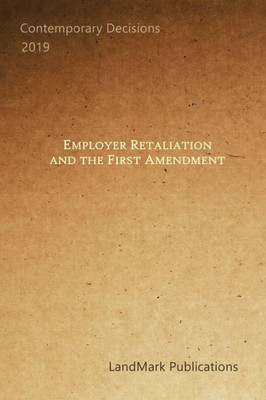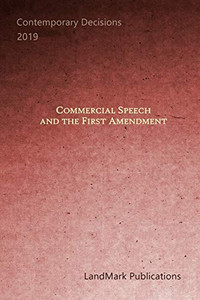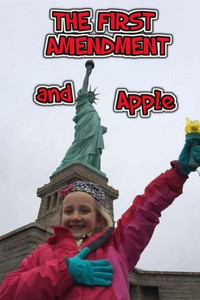
Employer Retaliation and the First Amendment
Independently published
ISBN13:
9781799115694
$35.57
THIS CASEBOOK contains a selection of U. S. Court of Appeals decisions that analyze and discuss issues surrounding employer retaliation claims under the First Amendment to the U. S. Constitution. * * * "The First Amendment, incorporated against the states through the Fourteenth Amendment, shields government employees from retaliation for engaging in protected speech." Diadenko v. Folino, 741 F.3d 751, 755 (7th Cir. 2013). To prevail on a First Amendment retaliation claim, "a public employee must show that: (1) she engaged in constitutionally protected speech; (2) she suffered a deprivation because of her employer's action; and (3) her protected speech was a but-for cause of the employer's action." Id. * * * With respect to the third factor, a plaintiff must "show that a violation of his First Amendment rights was a motivating factor of the harm he's complaining of." Thayer v. Chiczewski, 705 F.3d 237, 251 (7th Cir. 2012) (internal quotation marks omitted) (quoting Greene v. Doruff, 660 F.3d 975, 977 (7th Cir. 2011)). After the plaintiff makes that showing, "the burden shifts to the defendant to show that the harm would have occurred anyway." Id. at 251-52 (quoting Greene, 660 F.3d at 977). "Once a defendant produces evidence that the same decision would have been made in the absence of the protected speech, the burden shifts back to the plaintiff to demonstrate that the proffered reason was pretextual and that the real reason was retaliatory animus." Id. at 252. "At the summary judgment stage, this means a plaintiff must produce evidence upon which a rational finder of fact could infer that the defendant's proffered reason is a lie." Id. (quoting Zellner v. Herrick, 639 F.3d 371, 379 (7th Cir. 2011)). * * *Ordinarily, "the persuasiveness of an employer's non-retaliatory explanation... is 'for the finder of fact to assess.'" Massey v. Johnson, 457 F.3d 711, 719 (7th Cir. 2006) (quoting Venters v. City of Delphi, 123 F.3d 956, 973 (7th Cir. 1997)). However, "summary judgment should be granted when, in light of the defendant's unrebutted evidence, 'the court can say without reservation that a reasonable finder of fact would be compelled to credit the employer's case on this point.'" Id. (quoting Venters, 123 F.3d at 973). "We have repeatedly emphasized that when 'assessing a plaintiff's claim that an employer's explanation is pretextual, we do not... second-guess[] an employer's facially legitimate business decisions.'" Lord v. High Voltage Software, Inc., 839 F.3d 556, 564 (7th Cir. 2016) (alterations in original) (quoting Argyropoulos v. City of Alton, 539 F.3d 724, 736 (7th Cir. 2008)). "An employer's reasons for firing an employee can be 'foolish or trivial or even baseless, ' as long as they are 'honestly believed.'" Id. (quoting Culver v. Gorman & Co., 416 F.3d 540, 547 (7th Cir. 2005)).Milliman v. County of McHenry, 893 F. 3d 422 (7th Cir. 2018)
- | Author: Landmark Publications
- | Publisher: Independently published
- | Publication Date: Apr 01, 2019
- | Number of Pages: 550 pages
- | Language: English
- | Binding: Paperback
- | ISBN-10: 1799115690
- | ISBN-13: 9781799115694
- Author:
- Landmark Publications
- Publisher:
- Independently published
- Publication Date:
- Apr 01, 2019
- Number of pages:
- 550 pages
- Language:
- English
- Binding:
- Paperback
- ISBN-10:
- 1799115690
- ISBN-13:
- 9781799115694




